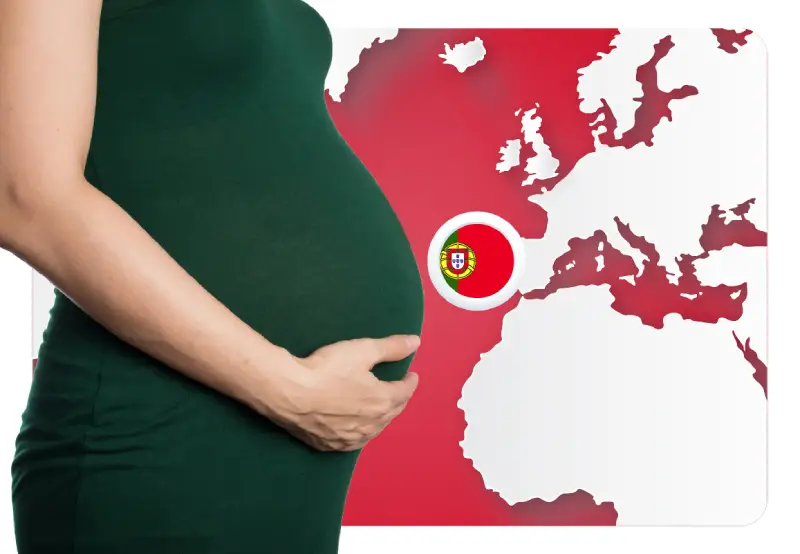Surrogacy Portugal
Surrogacy agency Portugal
Who can do surrogacy procedures in Portugal
In Portugal, the following people can carry out surrogacy procedures:
Portuguese heterosexual couples, or with permanent residence in Portugal, that are married, in which the commissioning mother lacks a uterus.
The surrogacy law in PORTUGAL
On 22 August 2016, Law 25/2016 was published, establishing the conditions to implement surrogacy in Portugal, which was not allowed until then, coming into force in August 2017.
It was repealed by the Portuguese constitutional court, considering that it violated principles and rights, including the repentance of the surrogate mother.
In July 2019, a surrogacy bill was passed again, but there was no consensus among members of parliament to include the period of repentance, so the Constitutional Court vetoed it again.
Subsequently, on 26 November 2021 it was approved again, (promulgated by the President of Portugal on 30 November 2021) allowing the surrogate to repent within 20 days after the birth.
The regulation allows access to the so-called "surrogate wombs" to women without a uterus or with an injury or clinical situation that prevents them "absolutely and definitively" from becoming pregnant, without any financial benefit.
Portuguese heterosexual couples, or with permanent residence in Portugal, that are married, in which the commissioning mother lacks a uterus.
The surrogacy law in PORTUGAL
On 22 August 2016, Law 25/2016 was published, establishing the conditions to implement surrogacy in Portugal, which was not allowed until then, coming into force in August 2017.
It was repealed by the Portuguese constitutional court, considering that it violated principles and rights, including the repentance of the surrogate mother.
In July 2019, a surrogacy bill was passed again, but there was no consensus among members of parliament to include the period of repentance, so the Constitutional Court vetoed it again.
Subsequently, on 26 November 2021 it was approved again, (promulgated by the President of Portugal on 30 November 2021) allowing the surrogate to repent within 20 days after the birth.
The regulation allows access to the so-called "surrogate wombs" to women without a uterus or with an injury or clinical situation that prevents them "absolutely and definitively" from becoming pregnant, without any financial benefit.

Special characteristics of the country:
The surrogacy law in Portugal requires that the surrogate must prove with a medical certificate that she does not have a uterus, or that as a result of medical problems, her uterus will not be able to gestate a baby. The law makes no mention of other possible reasons, which greatly reduces the possibilities of access:
Only altruistic surrogacy is allowed. The surrogate mother cannot receive any remuneration or financial compensation for carrying the pregnancy to term.
You must be Portuguese or a permanent resident in Portugal.
You must be a married heterosexual couple (excluding single people).
The performance and acceptance of the treatment will depend on the authorisation of the CNPMA (Conselho Nacional de Procriação Medicamente Assistida) and the prior opinion of the council of Order of Doctors (Ordem dos Médicos).
There is no social security, therefore, all medical expenses that may occur are at your own expense.
There is no fixed price for surrogacy in Portugal. There are extra costs, such as incubators, etc. You will have to pay them and the cost of the process may increase.
In all the time that the law has been in force since 2016, there has only been one surrogacy process, in which an intended mother used her own mother (i.e. the future grandmother of the baby) as a surrogate to carry the baby, which makes this law a nice theory, but in practice very few couples can take advantage of it.
Only altruistic surrogacy is allowed. The surrogate mother cannot receive any remuneration or financial compensation for carrying the pregnancy to term.
You must be Portuguese or a permanent resident in Portugal.
You must be a married heterosexual couple (excluding single people).
The performance and acceptance of the treatment will depend on the authorisation of the CNPMA (Conselho Nacional de Procriação Medicamente Assistida) and the prior opinion of the council of Order of Doctors (Ordem dos Médicos).
There is no social security, therefore, all medical expenses that may occur are at your own expense.
There is no fixed price for surrogacy in Portugal. There are extra costs, such as incubators, etc. You will have to pay them and the cost of the process may increase.
In all the time that the law has been in force since 2016, there has only been one surrogacy process, in which an intended mother used her own mother (i.e. the future grandmother of the baby) as a surrogate to carry the baby, which makes this law a nice theory, but in practice very few couples can take advantage of it.












